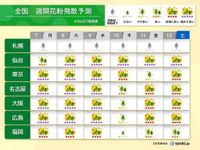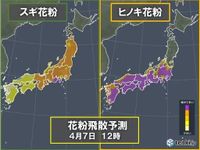As spring unfolds, the battle against hay fever intensifies across Japan, with an alarming increase in pollen levels reported nationwide. According to the latest survey conducted by Nichiken Food in collaboration with Net Asia Research, a staggering 75% of those suffering from hay fever experience symptoms primarily in March, making it the peak month for allergy sufferers.
The survey, which took place from February 3 to February 4, 2025, targeted individuals aged 15 to 69 who have been diagnosed with hay fever or self-identify as having the condition. The findings reveal that wearing masks has become the most common preventive measure, with 63% of respondents adopting this practice. Other significant countermeasures include taking hay fever medication (49.9%), washing hands and gargling (47.3%), and using eye drops (47.3%). Interestingly, about 12.3% of participants reported consuming foods believed to alleviate allergy symptoms.
Despite the availability of medication and preventive measures, nearly 27.4% of respondents expressed resistance to taking hay fever medication, a sentiment notably higher among individuals in their 60s, where 38% reported feeling hesitant. This reluctance raises concerns about the management of hay fever symptoms, especially as pollen levels are expected to remain high well into April.
In terms of geographic variation, the survey highlighted that the onset of symptoms varies by region. For example, in the Kanto and Kinki regions, March remains the month with the highest reported symptoms, while in Hokkaido and Tohoku, April takes precedence. This suggests that regional climate and vegetation play a significant role in the timing and severity of hay fever symptoms.
Moreover, the survey also explored public awareness regarding foods that can alleviate allergies. Surprisingly, only 39.7% of respondents recognized that certain foods could help, with a mere 7.6% aware that green citrus fruits, specifically immature Wenzhou oranges, could alleviate allergy symptoms. This lack of awareness underscores the need for better education on dietary interventions for allergy management.
In another notable finding, 73% of employed individuals expressed a desire to work in environments that implement hay fever countermeasures. This sentiment was echoed among students, with 73.6% indicating a preference for schools that actively address hay fever issues. The desire for supportive environments reflects the impact of hay fever on daily life and productivity.
As pollen levels continue to rise, the Japan Meteorological Agency has issued warnings about widespread pollen scattering across regions from Sendai to Fukuoka. On April 7, 2025, significant pollen dispersal is expected, prompting health experts to advise individuals with hay fever to take thorough preventive measures. This includes staying indoors during peak pollen times and utilizing air purifiers to minimize exposure.
According to reports, while the scattering of cedar pollen has begun to subside in certain regions, cypress pollen is now at its peak, particularly in Kinki, Kanto, and Hokuriku areas. The Tokyo Metropolitan Allergy Information Navi has noted that approximately 51% of the predicted maximum pollen levels have already been recorded in the Tama area, with Chiyoda Ward reporting 62% as of March 31, 2025. This data highlights the ongoing challenges faced by allergy sufferers as they navigate the pollen-laden environment.
In light of these developments, health professionals emphasize the importance of continuous monitoring of pollen forecasts and weather conditions. Even after the peak pollen season, which is expected to subside after mid-April, pollen may still be present around the Golden Week holiday, necessitating ongoing vigilance.
In a lighter vein, the survey also included a fun question about which celebrities might still perform flawlessly despite suffering from hay fever. Male actor Arata Iura topped the list, with 62 votes, while Yuki Amami was the favorite among female actors, receiving 53 votes. Respondents cited qualities such as strong mental fortitude and professional dedication as reasons for their choices.
As Japan grapples with the challenges posed by hay fever, the combination of awareness, preventive measures, and support from workplaces and educational institutions will be crucial in helping individuals manage their symptoms effectively. With the pollen season in full swing, proactive steps are essential for those affected to maintain their quality of life.
In conclusion, the recent survey findings underscore the pressing need for enhanced awareness and proactive measures against hay fever, especially as pollen levels remain high across the country. As individuals prepare for the ongoing pollen season, understanding the timing, symptoms, and effective countermeasures will be key to navigating this challenging time.






